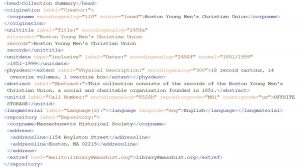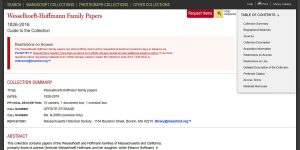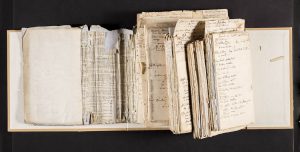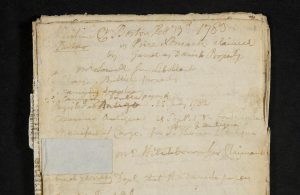by Susan Martin, Processing Archivist & EAD Coordinator
How does the Collections Services department of a manuscript library do its work without the manuscripts? Good question.
As you know, in light of the COVID-19 pandemic, the MHS is closed until further notice, and collecting is temporarily on hold. Essential operations personnel has access to the building, but the rest of the staff has been working remotely for about a month now, including the eleven members of my department, Collections Services.
At first it was hard to imagine what we could realistically accomplish without access to the collections for an extended period of time. After all, most of the work we do requires direct contact with the papers, photographs, and other items we collect. Our department is responsible for their acquisition, organization, description, preservation, conservation, and digitization. Even writing posts for the Beehive means consulting original documents, often in multiple collections. But we’ve learned there are many aspects of our work that can be done from home.
For example, collection guides. These online guides contain detailed descriptions of a collection’s contents and reflect their physical arrangement. Over the last month, Collections Services has been working remotely to encode many of our old paper guides, inventories, and box lists for the MHS website. Several members of our department are contributing to this effort, from simple data entry to revisions, encoding, and review.


We’re very glad to add these legacy guides to the hundreds of others already available. The advantage of having these descriptions online, of course, is that the text is fully indexed and searchable. Researchers will then use these guides to request materials through our automated system.
Another work-from-home project, this one headed by the Collections Services digital team, is the ongoing digitization of some of the papers of Robert Treat Paine. Paine was a prominent lawyer, politician, judge, and signer of the Declaration of Independence. He prosecuted both the Boston Massacre trial and the Shays’ Rebellion trial. His papers include thousands of pages of legal notes on the cases with which he was involved. The notes are voluminous and messy…

So this is a very large undertaking. The digital team has been working on this project for some time, and many pages have already been digitized. You can find them by going to the Robert Treat Paine collection guide and following the “digital content” links. Eventually four of these thick bundles of legal notes will be available online.
The digital team and the MHS Publications department are also working together on a pilot project to transcribe these notes. During our closure, members of Collections Services have been recruited to create the transcriptions. They’re recording the name or title of each case, the town or court in which it was heard, the date, and a few names or keywords where available. Publications calls this process “calendaring.” We’re fortunate to have so many staff members with experience reading old handwriting, because Paine’s is notoriously challenging!

One last project I want to be sure to mention is our brand-new website entitled “Witness to History: What Are Your COVID-19 Experiences?” This site is designed with all of you in mind. We’d love to hear what you’re thinking, feeling, and going through during this momentous time. You may choose to use our web form or just keep your own journal and donate it to us. We welcome photographs, as well. Your contributions will be added to the many other diaries and memoirs in our collections. We hope you’ll consider sharing with us.
It’s been a period of adjustment, but, like many others around the world, the Collections Services department and the MHS as a whole have learned new ways of collaborating. We rely on e-mail, online workspaces, and video conferencing to keep in touch and track workflows. We’ve delegated projects differently and even shared staff between departments.
However, the health and well-being of our community and all other communities around the world are paramount. Take care of yourselves, and we hope to see you soon at 1154 Boylston Street.

